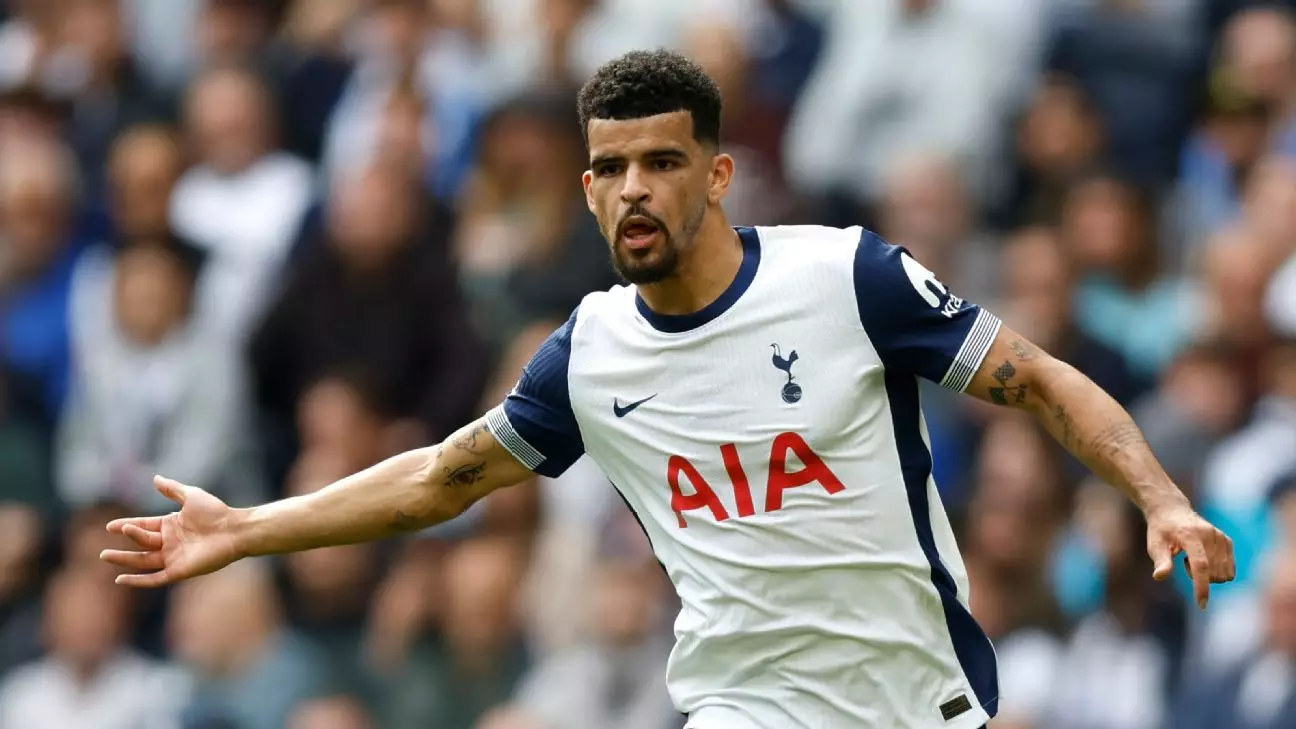In the competitive world of football, transfers often come with an intensity of scrutiny and expectation. This reality has recently been illustrated by the case of Dominic Solanke, who made headlines with his move to Tottenham Hotspur for a staggering £65 million ($86 million). Despite this hefty price tag, the 27-year-old striker has yet to leave a noticeable mark on his new club, prompting discussions about his performance and potential. Spurs’ manager, Ange Postecoglou, has stepped forward to advocate for patience and a more measured approach when evaluating Solanke’s contributions thus far.
A New Chapter Amidst Injuries
Solanke’s journey at Tottenham got off to an unfortunate start. He sustained an ankle injury during his debut at Leicester City, limiting his appearances and preventing him from acclimatizing as intended. With only three games under his belt, he has not yet scored, leading many to question if he is worth the investment. In the frantic atmosphere of the Premier League, where results dictate narratives, Postecoglou’s assertion that fans are too quick to judge is both insightful and essential. He underlines that evaluating a player’s impact after only a handful of games is not only premature but also disregards the complexities of professional sports transitions.
The manager’s call for “taking a breath” speaks to a broader issue in modern football. Social media and a 24-hour news cycle often create an environment where instant reactions are expected, overshadowing the necessity for patience. Solanke, having experienced a significant shift by transitioning from Bournemouth to a club like Tottenham—a well-renowned name in the Premier League—needs time to integrate fully into a different system and culture.
The weight of a high transfer fee can play a significant psychological role in a player’s performance. Solanke’s burden is compounded by the expectations fans and pundits place on him, particularly in moments where he has missed key opportunities, as seen in the recent north London derby against Arsenal. Postecoglou aptly notes that even established strikers go through dry spells, yet the relentless spotlight on newcomers often fails to acknowledge this reality.
The Australian manager insists that Solanke has fittingly adjusted to life at Tottenham, barring the injury setbacks, stating that he has the potential to be a great asset for the team. This belief not only highlights Postecoglou’s confidence in Solanke but also reinforces the notion that developing form takes time, especially for players coming from a different league or playing style. The emphasis must be placed on Solanke regaining his match fitness and finding his rhythm in Tottenham’s setup.
As the season unfolds, Tottenham’s start has drawn mixed responses from fans, exemplified by the reaction during a recent Carabao Cup fixture. The decision to substitute Lucas Bergvall sparked boos, reflecting a faction of supporters who may be uneasy with the current trajectory. Yet Postecoglou reminds everyone that emotions can cloud reason, advocating for a rational approach over immediate judgments.
He argues that the early part of any season is critical for building a cohesive unit and that fluctuating results should not precipitate panic or harsh criticism. Cultivating a team identity takes time, especially under a new managerial regime, and understanding that the process may involve bumps along the way is vital. As Solanke continues to integrate and the team evolves under Postecoglou’s vision, the focus must remain on long-term growth rather than short-term disappointment.
Conclusion: A Journey of Adaptation
The case of Dominic Solanke at Tottenham encapsulates various challenges inherent to high-stakes football. The call for patience, voiced by Postecoglou, is not merely about Solanke but speaks to a wider culture in sports where instant gratification is often demanded. By allowing players the space to adapt, clubs like Tottenham can foster environments where talent can thrive and eventually bear fruit. Rather than jumping to conclusions after a few uneven performances, supporters and analysts alike should appreciate the nuances of player development, particularly for those transitioning to new challenges.
